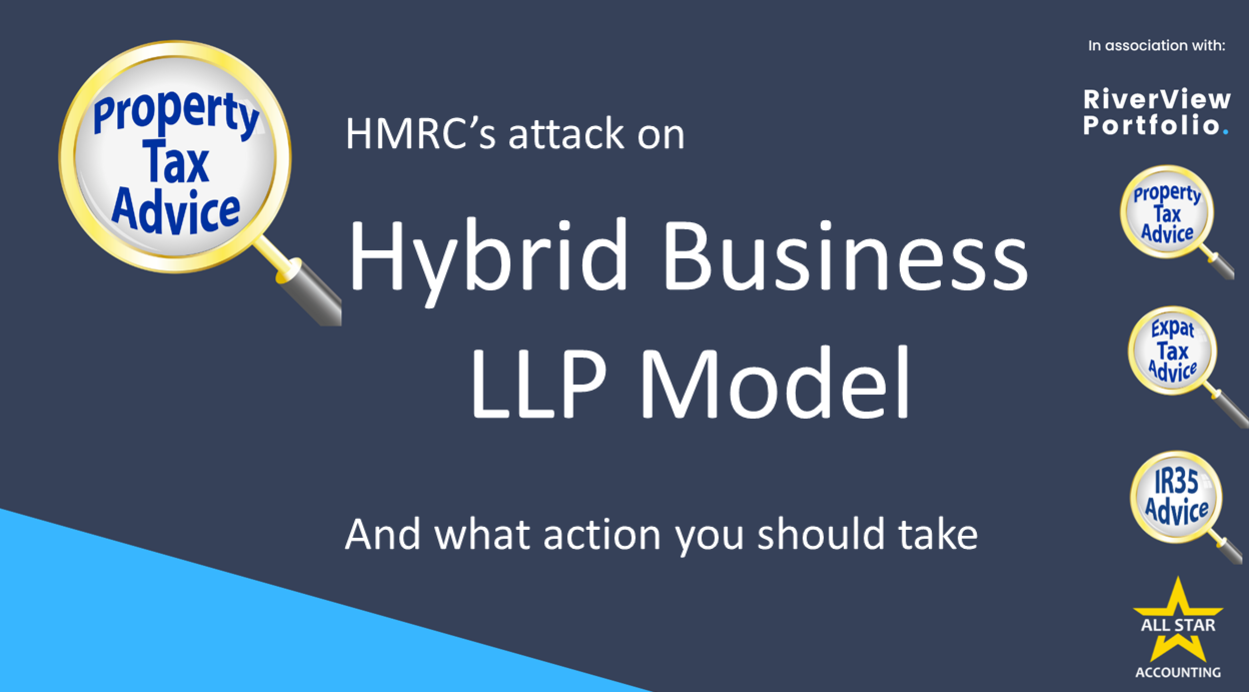What happens now for those using the hybrid partnerships
Posted on 4th December 2023 at 08:25
Yes, there has been a lot of chatter about this in the forums, and yes, we’ve been warning clients to avoid yet another “scheme”. We’re always happy to help people get themselves out of the mire that they’ve walked into.
HMRC have published on 16th November 2023, the following (we’ve annotated and added as you’ll see).
“HMRC is aware of a tax avoidance scheme being marketed as a tax planning option available to individual property landlords. This scheme is sometimes referred to as a hybrid business model and claims to bypass mortgage interest relief restrictions, reduce the tax payable on profits and reduce Capital Gains Tax and Inheritance Tax.”
What is the hybrid tax model, well HMRC go on to explain it.
The hybrid tax model “... seek to avoid tax by allowing individual or joint property landlords to transfer their properties to a limited liability partnership (LLP) with a corporate member. The LLP then allocates profits on a discretionary basis to members such that the individual members remain basic rate taxpayers and the remaining profits are allocated to the corporate member. The corporate member claims a deduction for finance costs (such as mortgage interest) relating to the properties.”
There have been a lot of recognised and respected organisations that have either directly promoted, or allowed advertisements from Less Tax for Landlords, the scheme promoter and amongst these there is even the NRLA National Residential Landlords Association, who published on 16th October that “… we have a duty to ensure that all companies promoted to the NRLA membership offer the highest quality and level of service. As such, while we investigate these claims, we have suspended partnership activity with Less Tax for Landlords.” It is a shame that organisations engage with such promoters in the pursuit of revenue for themselves.
“HMRC’s view of these arrangements is that they do not work as the claimed advantages are caught by several different pieces of legislation”. Further down into this article, we have shared the information that was contained in HMRC’s Spotlight 63. The link is: https://bit.ly/spotlight-63
The bad news for the sellers of these schemes is HMRC’s commitment that they “will pursue those who promote or enable tax avoidance. This includes using the enablers penalty regime for anyone who designs, sells or enables the use of abusive tax avoidance arrangements which are later defeated by HMRC”.
Having already commented that for example only, the NRLA has been promoting the scheme enablers, we do wonder how far HMRC will define “promote”. We hope that all the fine institutions that have advertised or given succour to the enablers will not be pursued.
And in case anyone was daft enough to still be promoting this scheme, HMRC have further said they “will also use its powers under the Promoters of Tax Avoidance Schemes regime against those who continue to promote tax avoidance schemes”.
So what should you do now if you’ve used the Hybrid model
Your first action is to speak to a specialist property accountant and get advice on your situation, and then quickly, notify HMRC of your intent to remedy this and that will give you a short period in which you and we together, can establish what the tax evaded had been.
Yes, we can also negotiate with HMRC for time to pay if necessary, for the taxes that you will owe.
There are costs involved in getting professional advice and support, but the alternative is to metaphorically “fall on your sword” and you can take up HMRC’s offer and contact them directly by emailing spotlight63@hmrc.gov.uk and you then cross your fingers and hope that they deal gently with you.
What legislation has the hybrid scheme breached – well HMRC have almost thrown the book at it, and the list is...
• mixed member partnership legislation contained in Income Tax (Trading and Other Income) Act 2005, S850C and S850D, which details how excess profits of a corporate member of an LLP are reallocated to individual members
• disposal of income streams through partnerships anti-avoidance legislation contained within Income Tax Act 2007, Chapter 5AA, S809AAZA, which applies to charge the corporate members’ income on the transferor of the income stream (the landlord)
• Taxation of Chargeable Gains Act 1992 S59A, which treats any dealing in chargeable assets by an LLP as by the individual members — LLPs are transparent for tax purposes so members own a fractional share of assets, and this means the base cost of properties are unchanged following their introduction to the LLP
• a property rental business is likely to be within the exclusions from BPR of ‘making or holding investments’ under the Inheritance Tax Act 1984, s105(3) — the use of the hybrid business model does not change the availability of such relief
If any of you are using the tax avoidance scheme outlined in the Spotlight, you should settle your tax affairs promptly.
#hybridpartnerships #spotlight63 #hmrc #taxavoidanceschemes
Tagged as: HMRC
Share this post:







